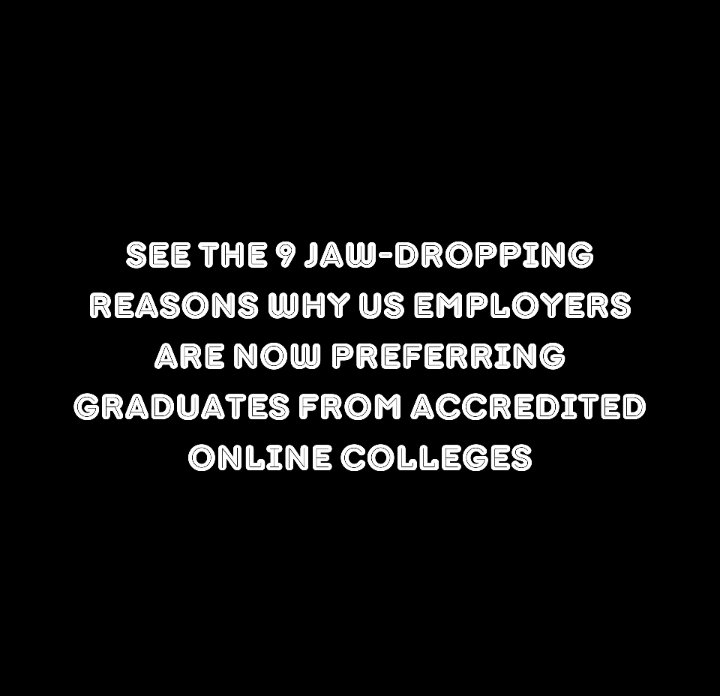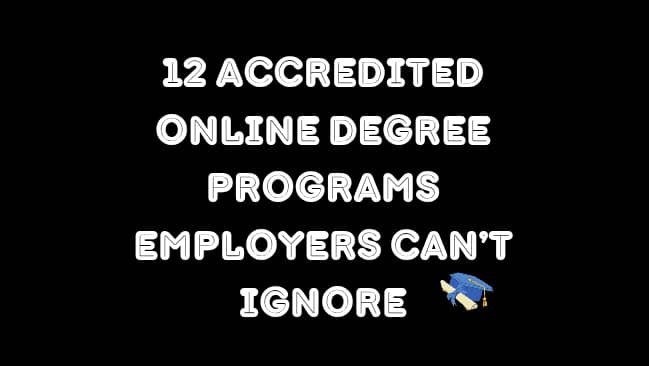The face of higher education in the United States has changed remarkably in the last ten years. Implementing online learning, which used to be considered as a rather doubtful form of learning, has turned into the mainstream and even a choice. A favorite choice of millions of students. In particular, after the pandemic, employers in various fields are becoming more concerned with hiring graduates of accredited online colleges, and they have a reason to do so.
In this article, we shall discuss the reasons why employers today are more intentional in hiring graduates of a certified online degree course, the increasing worth of distance learning, and the way in which this dynamic is fundamentally restructuring the American workforce.
Why Are Employers Are Now Ditching Grads From Traditional Colleges For Graduates From Accredited Online Colleges?
1. Accreditation Ensures Quality and Credibility
Accreditation constitutes one of the biggest shifts in employer perception. When a college or university gains accreditation from a reputable accrediting agency, it means that the college or university meets very high academic and administrative standards.
Employers prioritize accreditation, owing to the fact that it:
– Confirms the quality of education attained by the graduate.
– Verifies that the curriculum is in accordance with industry standards
– Make certain that the student’s credentials are valid.
Graduates earning degrees from online colleges that are regionally or nationally accredited are now regarded as equal to their on-campus peers, particularly when the institution is well-known.
2. Online Graduates Demonstrate Key Workflow Skills
Demonstrating success in online higher education calls for a distinct set of competencies that employers greatly prize, including:
– Time management: Online learners must chart their own study schedules, since the structure of in-person classes is absent.
– Self-motivation: Achieving success in an online program requires personal initiative and discipline.
– Digital skills: Virtual learning environments help students to become automated with digital tools, online teamwork and collaboration platforms, or virtual communication.
These skills align perfectly with the needs of modern hybrid and remote workplaces, making online graduates more adaptable and ready to thrive in dynamic work environments.
3. Flexibility Attracts Experienced and Career-Driven Learners
Most of the students that attend accredited online colleges are working adults, military members, or those reentering the field of higher learning. This population adds practical insights into their schooling and hence into the employment marketplace upon their graduation.
Employers note that:
– These students are graduates who have also managed to work, study, and take care of their families, demonstrating strength and perseverance.
– They can be people with some industry experience to supplement the academic qualifications.
– They can acquire their degrees in professionally relevant subjects like business, healthcare, IT, or education.
Such a combination of practicality and academicity makes such alumni very employable.
4. Employers also have their own online learning initiatives.
Interestingly, due to the online colleges becoming mainstream, large employers are now partnering with the online colleges to train and upskill their workers. Firms such as Walmart, Amazon, Google, and Target have established education reimbursement plans or direct sponsorship with accredited online institutions to offer continuing education to their workers.
This defense investment in online education has been important in normalizing and legitimizing online degrees because employers experience the obvious value of these programs.
5. Online Education Provides Industry-Relevant Programs
Among the greatest merits of accredited online programs is the flexibility of curriculum. Online colleges tend to change their course practices faster than traditional colleges, often changing to reflect current trends in the industry.
For example:
- Cybersecurity, cloud computing, and data analytics have become the staples in most online programs.
- Online colleges that specialize in health have also been providing specialized courses in telemedicine, health informatics, and nursing leadership.
- MBA schools are providing digital marketing, e-commerce, and entrepreneur degree programs.
This will help the employers because graduates who are trained in modern technologies and methods have a competitive advantage.
6. Cost-Efficiency and ROI
Accredited online degree programs are typically more budget-conscious than their traditional, on‐campus counterparts. Lower tuition, no commuting expenses, digital textbooks, and flexible scheduling commitments collectively render online education an economical choice for students.
Employers understand this and realize that these graduates:
– Frequently graduate with less student debt.
– Consequently, they tend to make smarter financial decisions.
– They tend to remain in jobs that correspond with their education over a longer period of time.
Such an impression of fiscal prudence and dedication may affect hiring decisions.
7. Online Degrees Are No Longer a Secret
Before now, graduates might have shied away from including “online” on their resumes. Today, this has radically changed.
Integrated by prestigious institutions such as Arizona State University, the University of Florida, Purdue Global, and Southern New Hampshire University, online degree programs are widely publicized with notable pride. Graduates from these programs are being recruited by leading Fortune 500 employers, underscoring the credentials conferred by an accredited online education.
8. Rise in Remote and Hybrid Workplaces
Since an increasing number of companies embrace remote-or-hybrid work arrangements, the competencies and outlook nurtured in online learning are perfectly attuned to present-day corporate culture.
Recruiters acknowledge that graduates who complete their studies online find it easy to operate autonomously. They ar also capable of communicating capably through digital platforms.
These characteristics render them well-prepared for jobs that extend beyond the confines of the conventional workplace.
9. Faster Time to Graduation and Immediate Workforce Entry
Countless accredited online degree programs feature accelerated learning pathways that let students earn their degrees in less time than is possible within traditional settings. These advantages are especially evident for…
- Competency-based models, where students advance as they demonstrate mastery of the curriculum.
- Transfer-friendly institutions that recognize prior college credits, military service, or work-based experience.
- Round-the-year course offerings that allow students to pursue studies either during the summer or the winter terms.
Consequently, graduates gain entry into the workforce sooner, a benefit that benefits both the student and the employer. For employers this translates into:
– Faster access to fresh talent
– Candidates who are eager and primed to work.
– Shorter lead time for filling in-demand positions
For employers grappling with rapid staff turnover or pressing personnel needs especially in sectors like healthcare, technology, and education, this compressed timeline offers a strategic advantage in ensuring swift role fills.
Conclusion: The Future Is Online and Accredited
The stigma that virtually accompanied online degrees has largely gone away. Accredited online colleges are currently producing work-ready graduates that exhibit experience, passion, and preparation to enter into the current labor market.
Employers around the country are becoming increasingly enlightened to the value of such graduates, regularly prioritizing their flexibility, maturity, and skills-alignment with the profession when hiring.
In case you are going to obtain an online diploma, make sure that the course has an accreditation and complements your desired career. The digital realm is the future of both education and the workforce, and the accredited online colleges lead this migration.



